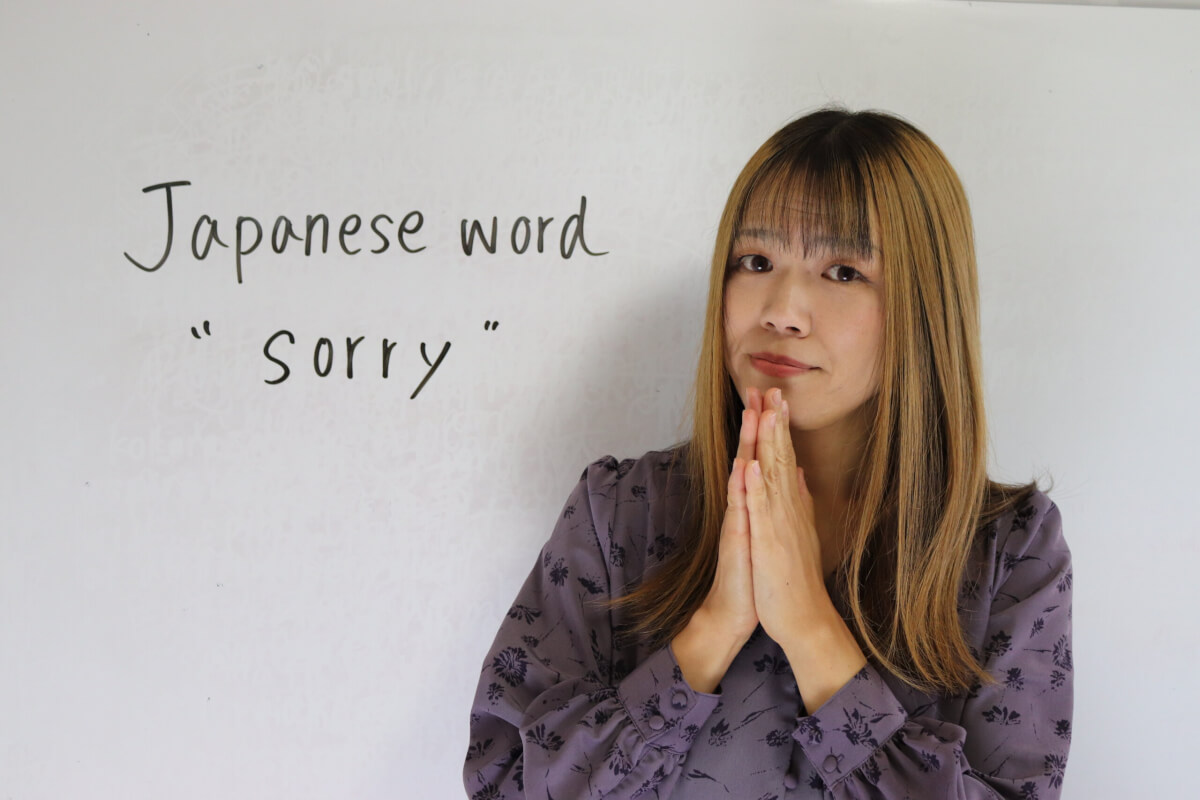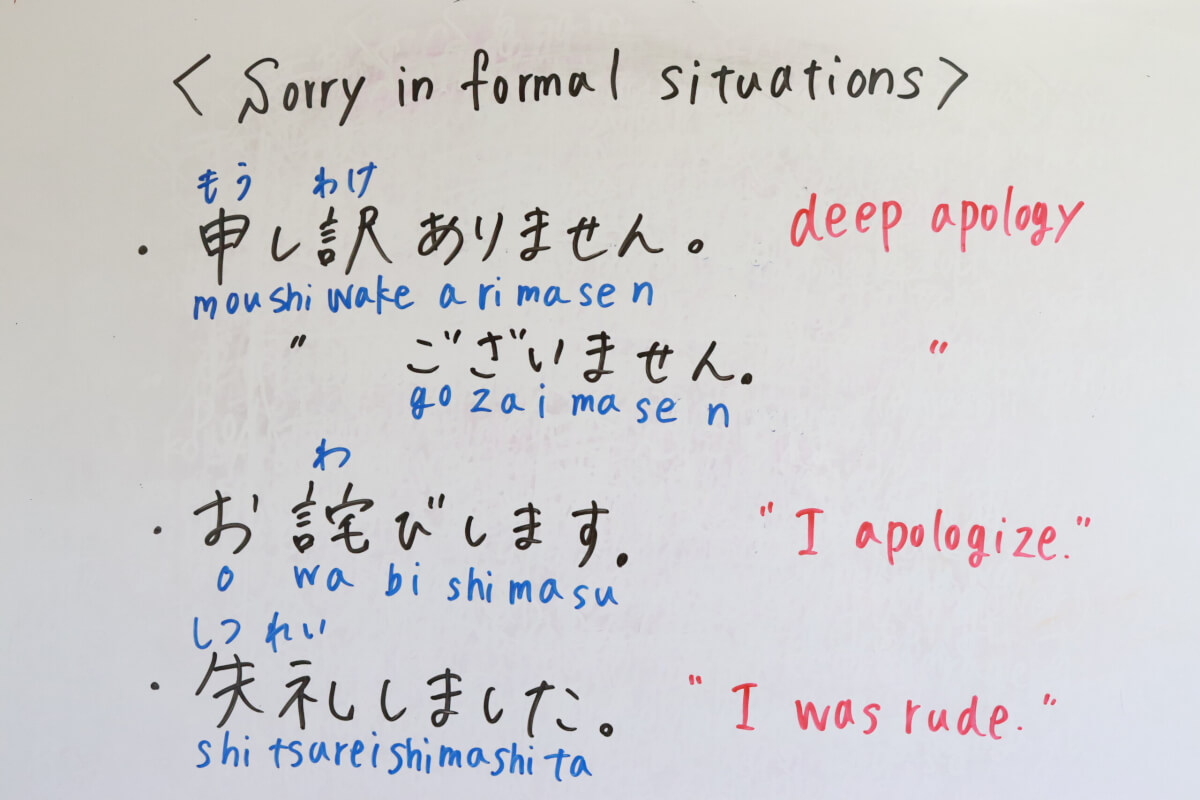- Release Date:
Japanese word sorry

In every language, knowing how to apologize is essential. Understanding the different ways to say "sorry" can help you navigate both casual and formal situations. Let's dive into the common expressions of apology in Japanese and when to use them.
ごめんなさい /gomen nasai/ – The Classic Apology

This is the most common way to say "sorry" in Japanese. It’s versatile and can be used in various contexts, especially in everyday situations. When you bump into someone by accident or if you're late meeting a friend, "ごめんなさい /gomen nasai/" is perfectly appropriate.
If you want to be a bit more casual, you can shorten it to "ごめん /Gomen/" or adding "ね/ne" to be friendly, "ごめんね /gomen ne/".
Example:
"ごめんね、遅(おそ)くなった。"
/gomen ne, osokunatta/
(Sorry for being late.)
すみません /sumimasen/ – Excuse Me / I’m Sorry
"すみません" is a polite and formal expression, often used in situations where you need to ask for someone's attention or apologize. It can mean both "excuse me" and "sorry," making it a flexible phrase. You'll hear this often in public places like stores or restaurants.
Example:
"すみません、道(みち)を教(おし)えていただけますか?"
/sumimasen, michi o oshiete itadakemasuka/
(Excuse me, could you tell me the way?)
You can also use it to apologize when you feel a light sense of guilt, like accidentally disturbing someone.
Example:
"すみません、手伝(てつ)っていただけますか?"
/sumimasen, tetsudatte itadakemasuka/
(Sorry to bother you, but could you help me?)
申し訳ありません /moushiwake arimasen/ – Deep Apology
When you need to make a formal, sincere apology, "申(もう)し訳(わけ)ありません /moushiwake arimasen/" is the phrase to use. This expression shows a deep sense of regret, often used in professional settings or when you've caused significant inconvenience.
You might hear it from service staff if something goes wrong with your order, or in business meetings when mistakes occur.
Example:
"この度(たび)は、大変(たいへん)ご迷惑(めいわく)をおかけして、申(もう)し訳(わけ)ありませんでした。"
/kono tabi wa, taihen gomeiwaku o okakeshite, moushiwake arimasen deshita/
(I sincerely apologize for the trouble I’ve caused.)
For an even more formal tone, you can say "申(もう)し訳(わけ)ございません /moushi wake gozaimasen/."
お詫びします /owabi shimasu/ – I Apologize
"お詫(わ)びします /owabi shimasu/" is often used in formal, written apologies, such as letters or official statements. It's a very formal and sincere way to apologize and is rarely used in casual conversations.
For an even more formal tone, you can add "深(ふか)く /fukaku/ deeply" and say "深(ふか)くお詫(わ)び申(もう)し上(あ)げます /fukaku owabi moushi agemasu/."
Example:
"この度(たび)の不手際(てぎわ)について、深(ふか)くお詫(わ)び申(もう)し上げます。"
/kono tabi no futegiwa ni tsuite, fukaku owabi moushi agemasu/
(I deeply apologize for the recent mishap.)
失礼しました /shitsurei shimashita/ – I Was Rude
"失礼(しつれい)しました /shitsurei shimashita/" literally means "I was rude" and is used when you've breached social etiquette or manners. It's commonly heard in formal settings, such as business meetings or after interrupting someone.
Example:
"電話(でんわ)が途中(とちゅう)で切(き)れてしまい、失礼(しつれい)しました。"
/denwa ga tochuu de kireteshimai, shitsurei shimashita/
(I apologize for the call getting disconnected.)
Knowing Which to Use
Japanese is a language rich in nuance, and using the right apology can depend on the situation, your relationship with the person, and the level of formality required.
For casual apologies, stick with "ごめんなさい /gomen nasai/" or "すみません /sumimasen/." If the situation calls for a more serious tone, "申し訳ありません /moushiwake arimasen/" or "お詫びします /owabi shimasu/" is more appropriate.
Apologizing properly in Japan shows respect and humility, which are key values in Japanese culture. By learning and using these expressions, you'll not only show politeness but also demonstrate a deeper understanding of the Japanese language and culture.
Feel free to adjust or add any personal touches!
